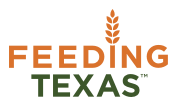For Immediate Release: 8/28/17
Contact: harvey@feedingtexas.org
Austin - Texas food banks ramped up efforts to help families impacted by this weekend’s hurricane on Monday, and expressed gratitude to state and federal partners for their support as well as thousands of concerned Americans for their charitable donations.
How is Feeding Texas responding to Harvey? Since Friday, Feeding Texas staff have been in constant contact with federal partners at the USDA and Feeding America. In Austin, our disaster coordinator is stationed at the State Operations Center to help coordinate Texas’ emergency food response. At this acute stage in the disaster, our most important goal is to facilitate the free flow of information among all humanitarian actors in the affected region. Our second goal is to educate the concerned public on the best ways to help without causing a “second disaster” of uncoordinated donations and volunteers.
How are local food banks responding? Following the weekend’s historic rainfall, affected food banks are in varying stages of the relief phase.
- Food banks that were directly in the hurricane’s path, such as the Food Bank of Corpus Christi and Food Bank of the Golden Crescent (Victoria) are open but operating at a reduced capacity due to damaged facilities.
- The Houston Food Bank, the nation’s largest food bank is still impassable due to flooding. At last report, a single staff member was stationed at the food bank to assist high-water vehicles sent by City and County shelters.
- Food banks just outside the disaster zone, such as the Central Texas Food Bank (Austin) and San Antonio Food Bank are working overtime to support area refugee shelters, as well as staging food for entry into the disaster area when flooding permits.
- Smaller member food banks in the affected area are either closed or assisting local shelters on an as-needed basis.
How are state partners responding? The Texas Health and Human Services Commission (HHSC) announced the approval of a federal waiver allowing families receiving SNAP benefits to purchase hot / prepared food, which is typically disallowed. The state is also considering activation of “D-SNAP” for residents of the eighteen counties designated a federal disaster area. D-SNAP is a federally-funded program for disaster victims similar to SNAP.
How are individuals and the philanthropic community responding? Feeding Texas and our member food banks are humbled by the immediate charitable support of thousands of online donors, as well as major gifts from across the nation.
At this point in the response, the best form of support is financial. When funds are donated to Feeding Texas or our member food banks, they can be immediately used to procure and distribute food, water, and cleaning / hygiene items for impacted families. Our food banks can also leverage these donations through bulk and planned buying, as well as avoid the costs associated with sorting and transporting mixed food donations.
Some donors are unable to give financially, or prefer to organize physical food drives in their communities. We welcome all forms of support, and simply ask that organizers contact us or their local food bank to see whether their donation can be held until affected food banks are ready to receive it. For these efforts, the items most requested by our food banks are:
- Hand-held snack items such as granola bars
- Pop-top, ready-to-eat items
- Shelf-stable pantry items such as peanut butter, tuna and soup
- Bottled water
- Cleaning supplies (bleach, non-bleach, paper towels, etc.)
- Personal hygiene items (toothbrushes, toothpaste, etc.)
What comes next? Hurricane Harvey is an unprecedented event in that recovery and ongoing disaster are happening at the same time. In the coming weeks, the expected movement of many thousands of refugee families from Houston to other Texas cities will strain charitable food relief across the state, while food assistance in our nation’s fourth-largest city will become an acute need. Feeding Texas and our member food banks are committed to addressing this long-term challenge with the continued help of our state & charitable partners, as well as the generosity of the public.
Feeding Texas leads a unified effort for a hunger-free Texas.
